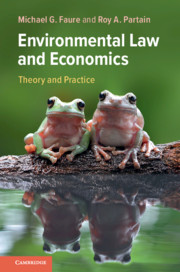Book contents
- Environmental Law and Economics
- Environmental Law and Economics
- Copyright page
- Contents
- Preface
- Acknowledgements
- Abbreviations
- 1 Introduction
- 2 Environmental Harm and Efficiency
- 3 Property Rights Approach to Environmental Law
- 4 Environmental Standard Setting
- 5 Principles of Environmental Law and Environmental Economics
- 6 Pricing Environmental Harm
- 7 Market-Based Instruments
- 8 Liability Rules
- 9 Environmental Regulation
- 10 Environmental Crime
- 11 Insurance for Environmental Damage
- 12 Compensation for Environmental Damage
- 13 Environmental Federalism
- 14 The Role of Environmental Law in Developing Countries
- 15 Epilogue
- References
- Index
5 - Principles of Environmental Law and Environmental Economics
Published online by Cambridge University Press: 13 September 2019
- Environmental Law and Economics
- Environmental Law and Economics
- Copyright page
- Contents
- Preface
- Acknowledgements
- Abbreviations
- 1 Introduction
- 2 Environmental Harm and Efficiency
- 3 Property Rights Approach to Environmental Law
- 4 Environmental Standard Setting
- 5 Principles of Environmental Law and Environmental Economics
- 6 Pricing Environmental Harm
- 7 Market-Based Instruments
- 8 Liability Rules
- 9 Environmental Regulation
- 10 Environmental Crime
- 11 Insurance for Environmental Damage
- 12 Compensation for Environmental Damage
- 13 Environmental Federalism
- 14 The Role of Environmental Law in Developing Countries
- 15 Epilogue
- References
- Index
Summary
If all of the potential Pigouvian externalities were internalised, both the positive and negative, then growth could be sustainable development. One of the challenges discussed was the complexity of integrating preferences for future generations who remain unable to voice concerns to present-time policymakers. Law and Economics literature considers the difficulty for decision makers to evaluate the risk of needing to take action based on incomplete information; the transaction costs of implementing the precautionary principle are complex. The polluter pays principle appears based on Pigou’s theory of externalities and on legal notions of justice, that tortfeasors should render damages for the injuries that they caused. Coase’s observation that either side of an injury could efficiently avoid that result and Calabresi’s maxim to search for the ‘least cost avoider’ have made implementation of the polluter pays principle both less obvious and less compelling. The allocation of human cum environmental rights is at its core an act of Coasean re-allocation, to provide one group with ex ante rights to reduce the transaction costs to achieve an efficient outcome for all parties. Overall, the Law and Economics literature has been in broad alignment with many of the key principles of general environmental law.
Keywords
- Type
- Chapter
- Information
- Environmental Law and EconomicsTheory and Practice, pp. 79 - 105Publisher: Cambridge University PressPrint publication year: 2019



